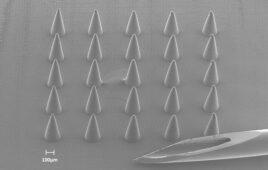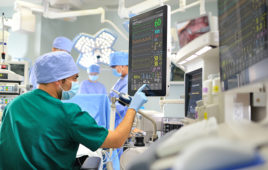Researchers at McMaster University’s Stem Cell and Cancer Research Institute have made significant steps forward in understanding the stem cells of the human blood system after discovering how a key protein allows for better control and regeneration of these cells.
This discovery, published today in the scientific journal Nature, illustrates how a protein called Musashi-2 regulates the function and development of important blood stem cells.
This knowledge provides new strategies that can be used to control the growth of these cells — cells that can be used as therapeutics for a range of life-threatening diseases but are, in general, in very short supply.
The senior author is Kristin Hope, principal investigator at the Stem Cell and Cancer Research Institute and assistant professor with McMaster University’s Department of Biochemistry and Biomedical Sciences. The research also involved collaborators from the University of California San Diego, University of Toronto and the University of Montreal.
Hope says the discovery could be impactful for the tens of thousands of patients suffering from a range of blood-based disorders including leukemia, lymphoma, aplastic anemia, sickle cell disease and more.
“We’ve really shone a light on the way these stem cells work. We now understand how they operate at a completely new level, and that provides us with a serious advantage in determining how to maximize these stem cells in therapeutics. With this newfound ability to control over the regeneration of these cells, more people will be able to get the treatment they need.”
The research team specifically looked at stem cells from umbilical cord blood, a proven but under-utilized source of stem cells for the treatment of adult blood cancers. These stem cells have the potential to become an important therapeutic for the thousands of people suffering from blood cancers who are awaiting the life-saving transplants.
Cells from umbilical cord blood have unique properties that make them easier to use for transplantation, including accessibility and adaptability. As a result, they allow for safer and more effective transplants.
The problem, Hope points out, is that there are very few stem cells available in individual cord blood samples — only about five per cent of all samples actually contain enough cells for a transplant. The team’s research into the importance of Musashi-2 and its role in expanding the number of stem cells in a given cord blood sample could help ease the current stem cell shortages.
Gene Yeo, associate professor at the University of California San Diego, co-corresponding author of the study, adds, “Most stem cell studies focus on proteins that bind DNA to control gene output. The prominent role we found for Musashi-2, a protein that instead binds to RNA, also underscores an urgency to study this second layer of gene regulation in stem cells.”
Hope says: “Providing enhanced numbers of stem cells for transplantation could alleviate some of the current post-transplantation complications and allow for faster recoveries, in turn reducing overall health care costs and wait times for newly diagnosed patients seeking treatment.”
“By expanding the stem cells as we have done, many more donated samples could now be used for transplants.”




